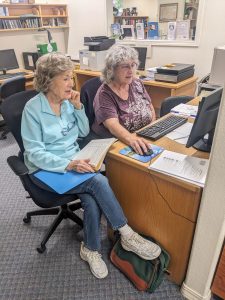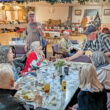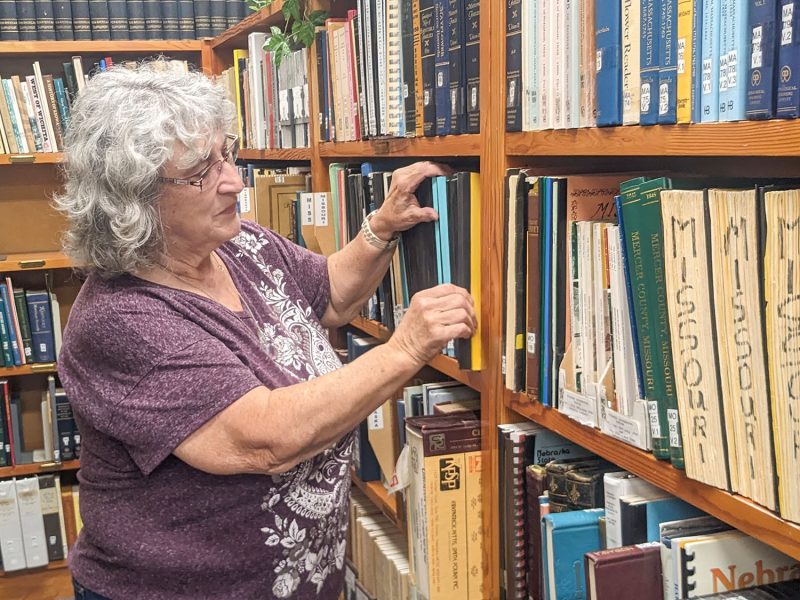Pulling the thread of one’s family history can be a tedious yet rewarding long-term process, but a handful of volunteers in Sweet Home make themselves available so the hunt is not so intimidating.
The Sweet Home Genealogical Society (SHGC) has command of a small building on Kalmia Street for use as a research library. Within the walls reside shelves of books, yearbooks, quarterlies, family files, old local newspapers, photographs and microfiche, all ready to give up their secrets to those who wish to know them.
Those secrets, bits of information from the past, are intended to enhance a family’s understanding about themselves, about where they came from, about where-why-or-how they belong in this world. It’s an exercise in exploring and unearthing the facts – and even the gossip – that make up the family’s larger narrative.
National Family History Month, observed every October, is a time set apart to encourage families to preserve those stories, remember where they came from and, ultimately, record their own present-day information to pass down to their future generations.
Family History Month was first enacted and proclaimed in 2001 after Senate Resolution 160 was passed, a bill sponsored by former US Senator Orrin Hatch.
A genealogy librarian at Indiana State Library quoted Hatch as saying, “Essentially we are all immigrants to this country. Our ancestors came from different parts of the globe and by searching for our roots, we come closer together as a human family.”
It does not take a stretch of the imagination to understand that tracing one’s family history is akin to detective work and treasure hunting. George Morgan, an author recognized as a genealogy expert, said he revels in the “thrill of the chase” as he meets new people and uncovers new information by researching through libraries, archives, courthouses and other means of investigation across the states.
“Sometimes there are brick walls, but often there are immense breakthroughs,” Morgan said.
It’s a hobby that several area residents and members of the SHGS have committed themselves to for decades. Member Laura Mather has been studying her and her husband’s genealogy since the 1960s.
“It’s a project that’s never done,” she said of the work.
Mather had gotten hold of a family book that had been published in 1890 and made it her goal to update the information to 1990.
“Those ‘fertile myrtles’ had 15, 16 kids,” she said, suggesting the enormity of the task. “They’re scattered all over this United States.”
For the first couple of decades doing her own research, the Internet wasn’t available and many relatives she reached out to were leery of her inquiries. Of her own family, she knew her line had “renegades,” but reaching very far back is nearly impossible because the family name was not only common but also spelled a variety of ways.
“So you hit roadblocks that you just can’t get through,” Mather said.
SHGS members first formed 49 years ago (December 1975) and moved into their newly built building 25 years ago (September 1999), providing access to books of historical information, state and county data, files of already-gathered bits of history on local families, quarterlies from various genealogical societies, local history, high school yearbooks, old photographs and more. Digitally, they provide access to Ancestry.com, FindAGrave.com, the FamilySearch Library, and digitized area newspapers on Newspapers.com.
Mather has considered the possibility of helping kids take an interest in genealogy because many of them, she’s heard, have been born in complicated family situations where some don’t even know who their real parents are.
New York Times writer Bruce Feiler set out to discover the “secret sauce” to stronger families and determined that the most important ingredient is developing a strong family narrative. Through research and tests, a pair of psychologists had concluded that children have a stronger sense of control over their lives, are more resilient and have a higher self-esteem when they know more about their family’s history.
Dr. Marshall Duke explained that a child’s sense of belonging to a larger family, to something bigger than themselves, builds in them that strength. Feiler noted that even companies and military organizations find more success when their teams understand the history of the organization.

He concluded that to help build a stronger family unit, parents should create, refine and retell the family’s positive moments as well as the hardships they’ve overcome through the many generations; but even knowing the following answers can build that foundation: where the grandparents grew up, where the parents went to high school and how they met, terrible things or illnesses that happened in the family, the child’s birth story, what jobs past family members worked, and the history behind the family’s country of origin.
“You want to know your people,” said SHGS member Bonnie Rickman, adding that people are more than just a body walking around in the world. “You need to learn so you can understand your family and where you fit.”
She recalled a time when she helped a homeless man find information about his own family.
“He knew stories, so he stood by me and we worked through them,” Rickman said. “It took a little while because he was trying to remember. He needed to know the Ellis Island and where they came from. I finally found it. He almost dropped to the floor and cried because he’s heard what he’s heard and he don’t have family to touch and get this (information).”
Sometimes one doesn’t know what kind of questions to ask unless they hear family members say something, Rickman noted. In her case, her father once mentioned the family had a lot of skeletons in the closet, but he didn’t elaborate.
“I’ve since did my own research and found a lot of those skeletons,” she said.
Her grandfather had also mentioned stories about his own life, and it later led Rickman to seek answers to those stories, such as why her great-grandparents moved from Missouri to Gold Beach.
“Who goes to Gold Beach, Oregon, from Missouri in 1877, and how did they do it?” she asked.
It’s a question left unanswered because anyone who held those stories has since passed away.
“I didn’t know to ask questions when your older family members are still alive,” Rickman said.
Resident Helen Preston might be able to agree, saying she lived in what she termed a “functional coma” during her younger years.
“I lived in my own little world when I was in high school and college,” Preston said. “I never asked questions, I didn’t care; I guess I was too busy.”
But one day, she explained, a question came to her mind, “How come I don’t know who my mother’s cousins were?”
Because for Preston, her own cousins have been really important to her. As she began looking into it, however, Preston discovered that everybody her mother talked about was a cousin because she had so many of them. Apparently they must have been important to her too. So Preston continues digging, looking to discover more about her parents’ families, trying to answer questions such as who they were, where they came from and what they did.
But like her and many others, usually the younger generations aren’t doing the research until they’re retired and have the time to do it.
“You finally stop thinking about yourself,” Preston said. “Your kids are grown and all of a sudden you have time to think every once in a while.”
Almost 50 years after forming, area residents continue to join the SHGS as they continue the hunt for those family stories, helping others build their family narrative while also building their own.
“I keep going and going because it’s fun to research (and) find that little nugget,” Rickman said.





